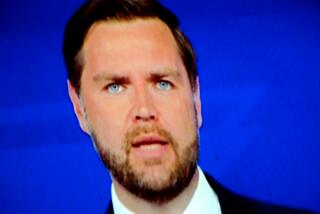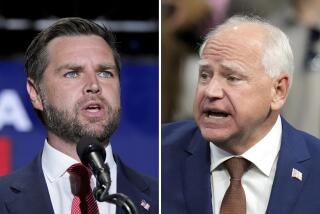In Debates, Substance Is Question : Election: In a recession, style takes back seat in voters’ minds, say Orange County political pundits who offer their insights on scoring the candidates.
- Share via
Will President Bush’s flailing arms and failing syntax do him in, or will he rise to the occasion?
Will Democrat Bill Clinton come across as Slick Willie or the deserving front-runner he has become?
Will Ross Perot trip over his Texas twang?
Historically, it has been matters of style that formed the lasting images and determined winners and losers in presidential debates.
But local debate judges--the professionals who carefully listen for substantive answers and frown on ineffective delivery--believe this year’s series may offer a departure from the past.
Aside from one obvious change--three candidates instead of two--the experts believe that this year substance may take precedence over style. And the winner will probably be decided by the credibility of his plans for dealing with what has become the central issue in the presidential contest, the nation’s listless economy.
“In 1988, you had the cold, sterile person (Democratic nominee Michael Dukakis), versus the person who had to demonstrate he was not a wimp (Republican nominee George Bush). And that’s what folks had to focus on,” said Jeanine Congalton, an assistant professor of speech communication at Cal State Fullerton.
“I think that this year, particularly with the economic questions, these debates might lend themselves more toward substance.”
Congalton and other academic experts who will be scoring the first presidential debate for the Times Orange County Edition, said that debates are traditionally judged on how the opponents explain the issues, present evidence to support their positions, refute opposing arguments, and at how they deliver their ideas.
But they concede that picking a winner may be a little more difficult this year, because the usual contest between Democrat and Republican is being crowded by independent candidate Perot.
“I think it will be interesting in both presidential and vice presidential debates to see how the three position themselves. Will (Bush or Clinton) let Perot take on the other person?” Congalton wondered.
With high stakes riding on the outcome of the debates, the college professors generally agreed on the advice they would offer to each of the camps.
President Bush, they said, needs to take a stand on the direction of the country instead of blaming the Democratic-controlled Congress for past failures; Clinton needs to be aggressive and be straightforward about tax increases to shed the “Slick Willie” image; and Perot needs to answer the questions.
“People have no sense of why they should vote for George Bush,” said Pat Ganer, professor of speech communication at Cypress College. “He’s got to have certain themes that he keeps coming back to (in the debate).”
Maryann Jones, a law professor at Western State University College of Law who has judged moot court competitions, said Clinton seems to be unafraid to confront issues head on, while Bush’s style “sounds so stilted and forced.”
“I think sometimes people are put off by that and believe he’s insensitive,” she said, adding that he is going to have to speak directly about what he is going to do to solve the country’s problems.
Ken Turknette, a part-time faculty member at Chapman University, added that when Bush talks about the economy, “it just has to seem totally true, and absolutely from the heart. He’s not going to win by spiking at family values or by pointing to Clinton’s draft status years ago. He has to talk about here and now.”
Conversely, he said, the best strategy for Clinton is to stay on the offensive while deftly defending his contention that the tax hikes in his program will not hurt the middle class.
Ganer said she would advise Clinton to “take a strong, clean stand even if it alienates some voters. His job is to shed the ‘Slick Willie’ image.”
And Perot, she said, needs to be prepared to answer questions about issues other than the economy. For example, should the kingdom of Tonga be used by the United States as a satellite base?
“He may have no response at all and it can make him look like he knows nothing on the issue of foreign policy,” Ganer said.
And Perot would commit a grievous error, Congalton added, if he shows how testy he becomes when difficult questions are asked. “He is going to have to directly answer the questions.”
Turknette said, “The best he can do for himself is probably attempt to show that both the other candidates have the wrong idea on the economic program.”
Although all three candidates are considered the best spin doctors for their own messages, errors of style--such as garbled sentences or shifty eyes--could overshadow what is actually said during the debate, the experts said.
“I look for eye contact; the ability to get reasonably involved vocally, changing the pitch around and really getting into it with coordinated gestures; a firm voice, but not one that’s out of control; emphatic (voice) and a good solid flow of words,” Turknette said.
All three candidates have faults in style, Ganer said.
“Bush has a horrible problem with syntax, and he has this problem with arm waving,” she said. “He looks like a man--and sounds like a man--who’s out of control.”
Clinton, she said, sometimes looks artificial. “Even when he’s viciously attacked, he kind of grins at the whole thing. That’s a good quality for a President, but it’s not a good quality for a candidate.”
But Perot has “image” problems he cannot control, Ganer concluded. In addition to his high-pitched, Texas twang, he is short.
“When they meet to shake hands, and people see George Bush and Bill Clinton, and then see little Ross Perot, it’s going to really hit people,” she said.
And while two more presidential debates will follow in the next eight days--a vice presidential debate also will be held this week--the first impression may be the lasting one, Jones said, especially for the undecided voters who will be looking for reasons to pick a candidate to support.
“They have not truly made up their minds and I think a truly weak performance by one of them could swing some voters,” Jones said.
What to Look for in the Debates
If you’d like to keep score on the presidential candidates today in their first public debate, here is a commonly used score card. Experts in the field of debate generally judge the effectiveness of academic debaters on at least five criteria. They rate each candidate’s performance on a scale of 1 to 5, with 1 being poor, 2 fair, 3 average, 4 excellent and 5 superior. You can compare your score to those of four local experts, whose comments and ratings will be published in Monday’s newspaper.
Analysis: How well did the candidate examine and explain the issues?
Reasoning: How well did the candidate advance his position?
Evidence: How well did the candidate use specific facts, and what was the quality of the evidence he used to support his position?
Refutation: Did the candidate successfully rebut his opponents’ positions and evidence?
Delivery: How effective was the candidate in presenting what he or she had to say?
More to Read
Get the L.A. Times Politics newsletter
Deeply reported insights into legislation, politics and policy from Sacramento, Washington and beyond. In your inbox three times per week.
You may occasionally receive promotional content from the Los Angeles Times.










